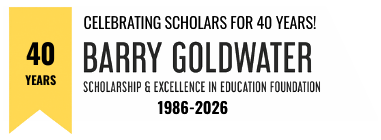APPLICATION TIPS FOR CAMPUS REPRESENTATIVES
Campus Representatives can develop programmatic strategies that will enhance students’ competitiveness for a Goldwater scholarship.
Promote involvement of undergraduates in on- and off-campus research
• To make students as competitive as possible for Goldwater awards, encourage all students to engage in research as early in their undergraduate careers as possible. Increasingly, the Foundation is seeing freshmen who have significant research experience.
• While it can be the “springboard” for a Goldwater-type project, a paper or presentation done solely for a lecture class does not, in general, rise to a level of research upon which a research essay is written nor should it be listed in the “Research Projects” section of a student’s Goldwater application.
• As presentations and publications are seen by reviewers as independent validations of the quality of the student’s work, these students are generally more competitive for Goldwater scholarships. Encourage students to talk with their mentors about the possibility of presenting and publishing their work. During your campus information sessions, make it known that student presentations and publications are important elements in a Goldwater review.
Make certain you are nominating the “right” student for a Goldwater scholarship.
• By the end of the Goldwater application process, students should be able to articulate a compelling case for why they want to be research scientists, engineers or mathematicians. If you are not convinced that a student intends to pursue an advanced degree or a research career, it is not likely the Goldwater reviewers will be convinced either. Make certain the student’s intent is to conduct research and that the student’s argument is persuasive. For psychology applicants, work in psychology that would be considered to be in the natural sciences is a strength.
Provide the student with feedback and guidance throughout the application process.
• While a CR or mentor should not write or edit a student’s narrative statements or research essay, feedback should be provided as these materials are developed, particularly in places where clarity and specificity would strengthen the writing.
• There is no excuse for the application to contain grammatical and spelling errors. Make certain the student proofreads the application materials. Tell the students you will not submit an application that contains grammatical and spelling errors.
Letters of recommendation can make or break a nomination.
• The strongest letters of recommendation come from those who have served as a research mentor for the student and who, in general, have worked with a student for an extended period of time. These individuals can provide helpful insights into a student’s potential and interest in pursuing a research career. Longer term working relationships also result in projects that are more likely to produce peer-reviewed research products like presentations and publications, externally validating the work.
• Letters from non-research mentors should come from individuals who know the student well and can provide specific examples of attributes that will contribute to the applicant’s ability to have a successful research career.
• A letter of recommendation from an individual outside the sciences, engineering or mathematics is strongly discouraged. If all three letters are not within the STEM area, it significantly reduces the likelihood that the student will be selected.
• Watch for errors in reference letters. Goldwater reviewers are not, for example, going to be impressed with a reference letter addressed to another award competition, no matter how prestigious the other award might be.
Include a CR statement.
• While CR narrative statements are not required, they are strongly recommended. Personalize each statement. Noting that these statements are limited to 2000 characters, you might succinctly describe 1) the on-campus competition that resulted in the nomination of the student, 2) the student’s particularly strong characteristics, or 3) any personal challenges the student had and overcame that you believe the reviewers should take into consideration.
Additional comments.
• The programs with the most competitive nominations often have Goldwater campus committees that both promote the program and select the nominees. If you do not have such a committee, consider creating one.
• If your school has strong sophomore nominees who are not named Scholars or possibly not nominated by your campus, encourage them to “keep working” and to apply again in their junior year. The success rate of students who are re-nominated is generally higher than first-time nominees.
• Students who aspire to a master’s degree are generally not competitive in the Goldwater competition.
